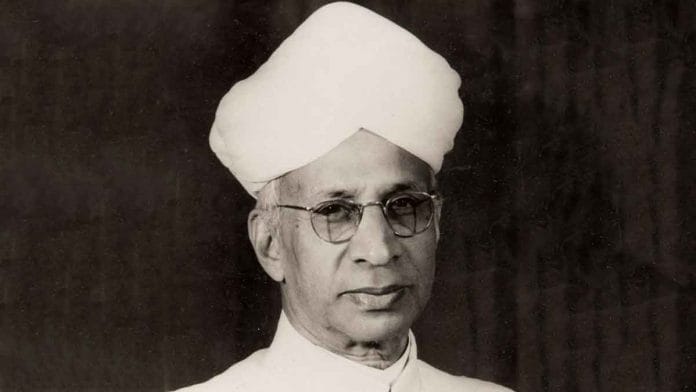There is a certain patience to philosophy. The kind that does not demand immediate answers and understands the slow unfolding of thought. Nation-building, too, demands patience to invest in visions long before they take shape and faith in ideas before they bloom into reality. Sarvepalli Radhakrishnan understood both.
Beneath the polished emblem of a statesman was a figure of unshaken conviction and intellect. When India stood at the threshold of freedom, it needed leaders who carried both wisdom and weight. Armed with an Oxford pedigree and a deep understanding of Indian thought, Radhakrishnan was precisely such a man.
Vice president in 1952 and president a decade later, he reminded a newly independent India: “The power of the Indian spirit has sustained us through difficult times. It will sustain us in the future if we believe in ourselves.’’ The thinker became the architect of the nation’s ethical foundations, and the course of history was set.
Bridging continents & centuries
There is a certain irony in the fact that Radhakrishnan was born to a devout Brahmin priest in the temple town of Tiruttani in 1888. His father lived by ritual and initially wanted his son to enter the priesthood. But Radhakrishnan’s early education—first in Tirupati’s local schools, then at Madras Christian College—steered him toward a different calling. He became modern India’s foremost champion of Advaita Vedanta, a philosophy that challenges caste and orthodoxy.
As someone who studied the Upanishads with as much fervour as Aristotle and Hegel, Radhakrishnan did not abandon tradition; he reinterpreted it. He pushed back against what he termed “uninformed Western criticism” of Hinduism, earning his place as the conduit between India’s spiritual heritage and modern thought.
On 20 October 1936, Sarvepalli Radhakrishnan stood before an audience at Oxford to deliver his inaugural lecture as the newly appointed Spalding Professor of Eastern Religions and Ethics. Titled ‘The World’s Unborn Soul’, the lecture dealt with moral confusion amid rising nationalism—a mirror to our own time.
“Nations have become mysterious symbols to whose protection we rally as savages to fetishes,” he wrote. “The soul that has found itself is no longer conscious of itself in its isolation. Those who are anxious to live in peace with their own species and all life will not find it possible to gloat over the massacres of large numbers of men simply because they do not belong to their race or country.”
It wasn’t his first visit to Oxford. In 1929, Radhakrishnan had already delivered the prestigious Hibbert Lectures at Manchester College, later published as An Idealist View of Life (1932). Over the years, Radhakrishnan would become a fixture at Oxford, holding the Spalding Chair till 1952 and earning a fellowship at All Souls College. But he was equally at home in Indian academia, having served as vice-chancellor at Andhra University in the 1930s and later at Banaras Hindu University.
When American writer Nancy Ross, known for translating Eastern philosophy for Western readers, first met him in 1953, she found him profound, tolerant, and gracious. The philosopher, by then the vice-president of India, welcomed her in khadi, extending a long, expressive hand, and spoke of the Buddha, Socrates, and the moral orbits of great teachers.
Ross observed that in the drawing room of his Delhi residence, a smiling Gandhi looked on from a frame, a small figure of the Buddha sat on the mantel, and modern landscapes softened the walls. Radhakrishnan effortlessly bridged continents and centuries.
For Ross, the conversation felt in step with the India she had just driven through: one populated by sadhus, snake charmers, veiled women, and “Kipling’s India” policemen. In Radhakrishnan’s presence, time did not seem linear. In him, she found “the vestiges of ancient cultures that lie on every hand to remind one of the long, cyclic history of humanity”. It was a reminder that in India, ‘today’ isn’t the only reality; the past coexists with the present and continues to shape it.
Also read: Morarji Desai scolded Vajpayee for drinking alcohol. He was India’s puritan PM
Touching the crown
Some forms of power do not announce themselves; they’re felt in the subtlest of gestures. Sarvepalli Radhakrishnan’s influence was the latter kind.
When Radhakrishnan met Mao in September 1957, he did something that startled the Chinese leader. He reached out and patted Mao’s cheek. The gesture was neither aggressive nor servile—it was paternal, almost amused.
Mao, for all his political cunning, was momentarily disarmed. What do you do when a foreign president treats you not as a threat but as a student? It was an assertion of quiet dominance. “Mr. Chairman, don’t be alarmed,” Radhakrishnan said, “I did the same to Stalin and the Pope.”
When Nehru needed someone to handle the Soviets in 1949, he sent Radhakrishnan instead of a hard-nosed diplomat. Eyebrows were raised: What business did a Vedanta scholar have in the land of Marx? But Radhakrishnan, appointed special envoy to Moscow, proved them all wrong. For 6 months, Stalin avoided him. Then, on 14 January 1950, the ice thawed.
Stalin summoned Radhakrishnan, not at midnight, as he did with most diplomats, but at 9 pm, out of respect for the professor’s early bedtime. When Radhakrishnan met one of the most feared men of the 20th century, he reached out and stroked his hair. Stalin, who commanded purges and gulags, didn’t flinch. Radhakrishnan did what few dared—he humanised Stalin. During the meeting, Stalin referred to Radhakrishnan as “Professor” while Radhakrishnan addressed him as “Marshal”, each sticking to a title that reflected their own world.
History often remembers conquerors. But every now and then, it remembers the philosopher who dared to touch their crown.
(Edited by Prasanna Bachchhav)






